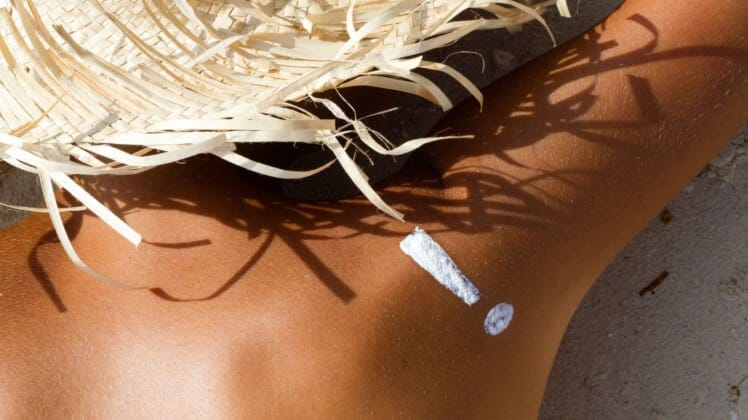10 Surprising Things That Make A Sunburn Worse – And What You Should Do Instead

By now, you know the importance of sun protection, but mistakes (and one too many margaritas) happen. There are times when, despite your best efforts, you still manage to get sunburned, admits Sheel Desai Solomon, MD, a board-certified dermatologist in Raleigh-Durham, NC, and founder of Preston Dermatology.
In this case, it’s important to get out of the sun, stat, and begin treating the skin to decrease damage, she says. But before you do anything to soothe that burning sensation, scroll through this list of surprising things that can make sunburn worse, plus what you should do instead.
1. Wearing tight clothing
“Your body responds to the trauma by increasing blood flow to the area to help with healing, resulting in redness and inflammation,” says Dr. Solomon. Slipping into skin-tight leggings and tops can exacerbate the effect, causing swelling and redness to become worse. Instead, opt for loose-fitting, cotton clothing so that your skin can breathe.
Also Read: All You Need To Know About Sunscreen
2. Taking hot showers
You may have heard that taking hot showers releases the heat from sunburned skin. Well, that’s a myth. Hot showers actually cause your skin to become more sensitive and strip it of the moisture needed to repair itself. “This may lead to blistering and possibly prolong the healing process,” Dr. Solomon says. Sticking to lukewarm or cool showers (no higher than what you would expect from a heated pool) will help ease discomfort and cut down on moisture loss, she says.
3. Using scented aloe
Don’t get us wrong, aloe is one of the best things you can reach for when you have a sunburn, thanks to its anti-inflammatory and hyper-hydrating properties. However, using a scented aloe can cause contact dermatitis, setting off redness, burning, and itching cautions Dr. Solomon. Always opt for fragrance-free formulas with a high concentration of pure aloe vera. Apply it immediately after showering, while the skin is still damp, and reapply as needed.
4. Exfoliating the skin
While you may be tempted to scrub away the scaly patches of skin, don’t. This is actually one of the worst things you can do for a sunburn, says Dr. Solomon, as it exposes the damaged layer of skin underneath and puts it at risk for infection. Instead, layer on lotion and allow the skin to slough off naturally.
5. Popping blisters
On that same note, never pop or pick at sun blisters. “That extra bubble of skin serves a fundamental purpose in protecting the wound,” says Dr. Solomon, adding that they should go away within a week. If your blisters begin to burst on their own, you may want to apply an antibiotic ointment; otherwise, continue moisturizing as usual.
Also Read: 10 Benefits Of Grapeseed Oil For Skin
6. Covering sunburn with makeup
“The only way the burn will heal is if you let your skin breathe,” says Dr. Solomon. “Plus, applying cosmetics with dirty sponges or brushes only increases your risk of infection or allergic reaction, which will ultimately make it look and feel worse.”
7. Applying coconut oil
“Coconut oil is great for moisturizing the skin in other instances, but when it comes to a burn, you should avoid it,” advises Dr. Solomon. That’s because it’s high in fatty acids, which will not only clog the pores and halt the healing process but might also aggravate inflammation, she says.
8. Using essential oils
Certain essential oils like rosemary and lavender make the skin more prone to burning. “Oil of bergamot is especially notorious for this and can cause a severe blistering reaction when exposed to the sun,” says Dr. Solomon.
9. Taking certain medications
Taking an anti-inflammatory medication, like acetaminophen or ibuprofen, can help soothe your skin once you’re sunburned. However, nonsteroidal anti-inflammatory drugs like ibuprofen and naproxen can also leave your skin more vulnerable to the sun. Dr. Solomon explains, “That’s because certain medications contain photosensitizing agents, molecules that absorb the sun’s UV rays and release them back into your skin, which damages and kills skin cells.” Other medications that increase your risk are antihistamines, antibiotics, and some acne medications.
10. Not drinking enough water
Sunburns dehydrate you from the inside out, so it’s important to stay hydrated. Up your intake of water and water-rich fruits like watermelon, strawberries, and cucumber, which also contain good-for-your-skin antioxidants and vitamins.
Also Read: 5 Amazing Reasons To Have Shower Plants
Explore More About:Self-Care